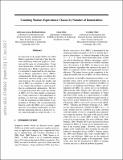Counting Markov equivalence classes by number of immoralities
Author(s)
Radhakrishnan, Adityanarayanan; Solus, Liam; Uhler, Caroline
DownloadAccepted version (369.6Kb)
Publisher with Creative Commons License
Publisher with Creative Commons License
Creative Commons Attribution
Terms of use
Metadata
Show full item recordAbstract
Two directed acyclic graphs (DAGs) are called Markov equivalent if and only if they have the same underlying undirected graph (i.e. skeleton) and the same set of immoralities. When using observational data alone and typical identifiability assumptions, such as faithfulness, a DAG model can only be determined up to Markov equivalence. Therefore, it is desirable to understand the size and number of Markov equivalence classes (MECs) combinatorially. In this paper, we address this enumerative question using a pair of generating functions that encode the number and size of MECs on a skeleton G, and in doing so we connect this problem to classical problems in combinatorial optimization. The first generating function is a graph polynomial that counts the number of MECs on G by their number of immoralities. Using connections to the independent set problem, we show that computing a DAG on G with the maximum possible number of immoralities is NP-hard. The second generating function counts the MECs on G according to their size. Via computer enumeration, we show that this generating function is distinct for every connected graph on p nodes for all p < 10.
Date issued
2017Department
Massachusetts Institute of Technology. Laboratory for Information and Decision Systems; Massachusetts Institute of Technology. Institute for Data, Systems, and SocietyJournal
Proceeding of the 33rd Conference on Uncertainty in Artificial Intelligence (UAI)
Publisher
Association for Uncertainty in Artificial Intelligence (AUAI)
Citation
Radhakrishnan, Adityanarayanan et al. "Counting Markov Equivalence Classes by Number of Immoralities." Proceedings of the 33rd Conference on Uncertainty in Artificial Intelligence (UAI), Sydney, Australia, August 11-15, 2017, AUAI Press, 2017.
Version: Author's final manuscript